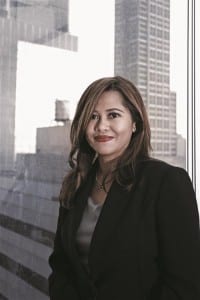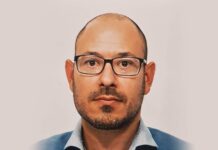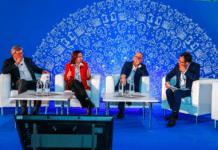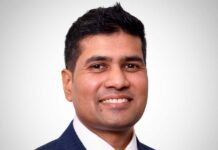Asia Pulp & Paper’s Chinese tissue division is to bring six new tissue machines on stream making a total new capacity of 354,000tpy – around 30% of the one million tpy of new tissue capacity coming online in China in 2015. TWM interviews Hoany Muljadi and Aida Greenbury.
Hoany Muljadi
Director of APP Group’s Tissue Division
 TWM/1: How is APP looking to grow further in the global tissue market?
TWM/1: How is APP looking to grow further in the global tissue market?
Muljadi: “The tissue market globally is going through mega shifts. While there is slow growth in the developed world, in the developing and emerging markets with increasing prosperity consumers are becoming more conscious of personal hygiene.
“Given our strong footprint in the developing markets APP is well poised to take advantage of this trend over the coming decade ahead. In addition there is huge scope to enter new markets and new pulp and tissue based categories. Our vision is to have number one brands which are clear leaders in their market along with the best talent and capability. We are also a fully vertically integrated enterprise which will continue to give us scale and cost advantage. And of course, we will continue to expand our converting footprint both organic and inorganic to be a step ahead of the growth.”
“We are beginning to enter the developed markets such as Japan. This is new opportunity for us.”
TWM2/What geographical markets are you targeting?
Muljadi: “We are uniquely placed. Our current strength is in developing markets where penetration and consumption is growing. So our intention is to further consolidate ourselves here particularly in Asia. For example China is very important for us. It will become the world’s largest tissue market by 2019 and we want to further consolidate our number one position in the categories we are present in and extend beyond.
“Second, we are beginning to enter the developed markets such as Japan. This is new opportunity for us.”
TWM3/Where do you see most growth for tissue products in Asia?
Muljadi: “We see the most growth in developing and emerging markets such as Indonesia, China and India where a growing middle class means more consumers focus on tissue products. And as we build relationship with global players there will always be private label opportunity as this is a strategic component to their global strategy. With this in mind, private label is something APP will seek to manufacture for those
retailers.
“Furthermore, APP is currently undertaking significant consumer research across Asia as we continue to put consumers at the centre of our market decisions. Our brands are already in strong position in most of our footprint. We also have competition from both multinational and local players which we welcome. Competition will lead to market development and finally consolidation to a few winners.
“The AfH opportunity in Asia is also huge. With increasing prosperity, travel and tourism is becoming more and more a part of our consumers’ lives while eating out in restaurants and hotels is also increasing. There is no shortage of opportunity to meet their needs in these locations. Our Livi brand is an essential driver for our AfH Go to Market strategy.”
TWM4/Is APP looking to acquire further in the tissue market or will future growth be organic?
Muljadi: “It will depend on the acquisition opportunities which are limited due to the few serious and long term players in the market. However, current focus is on working markets smarter to grow our share of market.”
TWM5/What are the main opportunities for APP in the tissue market?
Muljadi: “Being an organisation that believes in sustainability and doing significant work in that space we believe the key opportunity for us is to provide consumers with an environmentally-friendly choice while at the same time providing better value because of our vertical integration. So good value while caring for the planet.
“In addition, we also aim to explore beyond tissue applications, like wet wipes and disposable products to further strengthen our position and leverage synergies in terms of brand and distribution.”
TWM6/What are the three main challenges for APP in the tissue market?
Muljadi: “We look at our challenges as opportunities. We have the opportunity to build strong brands with global positions that resonate with our consumers. We have a number of brands which are very well known in their footprint such as Paseo and Breeze which we will extend further.
“The second opportunity is in deep consumer understanding which allows us to build a strong innovation pipeline that serves our consumers’ evolving needs. In the future in addition to hygiene we see opportunities in beauty care as well.
“The third opportunity for us is in the area of talent and culture. We are now building a solid talent base which any organisation can be proud of and bringing in a professional and winning culture.
“We truly believe our success in future hinges on our brands, our people and our winning organisational culture.”
TWM7/How are you reacting to overcapacity in the Chinese tissue market? Do you expect the situation to change in the short or long term?
Muljadi: “We believe the overcapacity situation in China is a short term phenomena as China will soon become the biggest tissue market in the world. In fact over the next decade, even more capacity will be required. We see ourselves as long term players and short term challenges do not distract us from our path. We believe, in China, finally the biggest will win and consolidate.”
TWM8/How has recent M&A activity in Asia changed the tissue market, and what challenges has it brought for the market?
Muljadi: “SCA’s purchase of China’s third largest tissue company Vinda means it has prioritised Asia as a key market to win which in a way validates our long term strategy. We always welcome competition as we are confident about our recipe for success.”
TWM9/How important is product innovation and sustainability for APP?
Muljadi: “We believe in providing our consumers with high quality product whilst caring for the planet. We have a well-established R&D department which is continuously working on creating products that make our consumers’ lives better and easier.
“Our sustainability journey has been accelerated in recent years, with the company going through a rather significant change in the way we operate as a natural resource reliant business.
“Our zero deforestation commitment has been critically important, not only for the preservation of natural forest, but for the indigenous people, communities, workers and flora and fauna that live within and around it. It is because of this that we made a clear commitment in February 2013 to the immediate end to natural forest clearance within our supply chain with the announcement of our Forest Conservation Policy.
“To build on this, in April 2014 we announced what we consider to be the largest commitment of its kind in Indonesia, to restore and support the conservation of one million hectares of rainforest across Indonesia. Protecting and restoring strategically selected areas on a landscape level is a vital part of the zero deforestation puzzle. By doing this we can ensure that as much valuable habitat as possible is protected against further encroachment.
“We believe that by assessing entire landscapes and creating clear tailor-made objectives and strategies, the maximum possible level of protection will be achieved, not just for the natural forest in our concessions, but for areas around them as well.
“We feel our Forest Conservation Policy is one of the most ambitious plans to tackle deforestation in the world, but we are just one company and we need help to tackle deforestation. That is why we are encouraging our customers and the wider market to adopt similar zero deforestation policies within their procurement, CSR and sustainability policies.”
Aida Greenbury
Managing director of sustainability and stakeholder engagement, APP
 TWM1/How has it been for you overseeing the process of APP becoming PEFC-certified? What were the main challenges and opportunities?
TWM1/How has it been for you overseeing the process of APP becoming PEFC-certified? What were the main challenges and opportunities?
Aida Greenbury: “All APP mills have been PEFC (Programme for the Endorsement of Forest Certification) Chain-of-Custody certified for several years. What’s recent is that the Indonesian Forest Certification Corporation (IFCC) was formally endorsed by PEFC in October 2014 and that two of APP’s suppliers have achieved IFCC-PEFC certification and can provide a local source of PEFC certified material.
“This is welcomed but in a quest to be constantly advancing and challenging our ongoing Forest Conservation Policy (FCP) and landscape approach commitments, we always try to embrace all credible certifications and continue to seek to go beyond PEFC’s requirements.”
TWM2/Where next for APP in terms of your environmental and sustainable efforts?
Greenbury: “Our core focus is on implementing our Forest Conservation Policy (FCP) and its landmark zero deforestation commitment. The recent Rainforest Alliance evaluation of our progress was very helpful in highlighting our success to date and where we need to continue to progress, which we formalised into our implementation plan for 2015 and beyond.
“At a high level, this includes the complex and challenging issues of third-party forest clearance, wildfire management and prevention, protection of High Conservation Value (HCV) lands within our supplier concession areas, development of best practices for operations in and protection and restoration of peat land, continually enhancing social conflict resolution and ensuring the rights and welfare of our suppliers’ workforces. Our implementation plan is large and complex, but we’ve made great progress in two plus years and I am confident that we’re on the right track.”
TWM3/Could you give some case-study details about a tissue site that has achieved PEFC-certification? How did you find the process, has the site become much leaner, more energy efficient?
Greenbury: “We’ve been making major investments in our overall fibre supply as the business expands and we implement the FCP. This includes chain of custody systems and traceability to provide assurance we are meeting zero deforestation commitments and legal requirements of policies like the European Union Timber Regulation (EUTR). PEFC and other national schemes such as TLTV (Timber Legality and Traceability Verification), PHPL (Sustainable Production Forest Management) and LEI (The Indonesian Ecolabelling Institute) certifications help reinforce this. As an integrated supplier, I believe APP has an advantage over its competitors in that we have more direct control of our fibre supply rather than needing to purchase all on the open market.”
TWM4/Are you seeing much demand for environmentally-friendly products in Asia?
Greenbury: “Yes. I believe Asia will eventually become the market leader for environmentally-friendly products, which is confirmed in recent research and sales data. Nielsen for example, found that Asia-Pacific consumers indicated a higher willingness to pay more for products and services provided by companies perceived as socially and environmentally responsible1 than consumers in other regions.
“This is likely due to consumers across Asia being more exposed to the negative environmental consequences in their communities. Take climate change for example – the Pew Research Centre recently found that Asia-Pacific, Latin America and Africa are leading the way in their concern for climate change, and this is partly because consumers in these regions feel increasingly exposed and vulnerable to ecosystem damage. Consumers across Asia increasingly see the link between product choices and environmental impact, and are rewarding companies they perceive are most responsible.”
1. http://www.nielsen.com/us/en/press-room/2014/global-consumers-are-willing-to-put-their-money-where-their-heart-is.html























 TWM/1: How is APP looking to grow further in the global tissue market?
TWM/1: How is APP looking to grow further in the global tissue market? TWM1/How has it been for you overseeing the process of APP becoming PEFC-certified? What were the main challenges and opportunities?
TWM1/How has it been for you overseeing the process of APP becoming PEFC-certified? What were the main challenges and opportunities?










